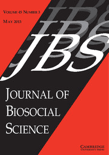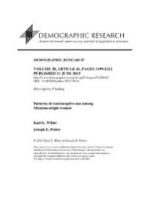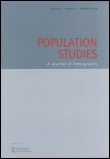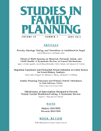
JOURNAL OF BIOSOCIAL SCIENCE
Scope & Guideline
Exploring the Interconnections of Biology and Society
Introduction
Aims and Scopes
- Health Inequities:
The journal extensively addresses disparities in health outcomes influenced by socioeconomic status, gender, ethnicity, and geographical location. It aims to uncover the underlying social determinants of health that contribute to these inequities. - Reproductive Health and Family Planning:
A significant portion of the journal's publications explores issues related to reproductive health, including access to family planning services, contraceptive use, maternal health, and the implications of reproductive choices on societal structures. - Cultural and Social Influences on Health:
The journal investigates how cultural norms, social practices, and gender roles influence health behaviors and outcomes, particularly in marginalized communities. This includes studies on gender-based violence, stigma related to health conditions, and the impact of cultural beliefs on health practices. - Population Dynamics and Health:
Research on population health, including demographic transitions, fertility trends, and migration patterns, is a core focus. The journal examines how these dynamics affect health outcomes at both individual and community levels. - Biocultural Perspectives:
The journal uniquely integrates biological and cultural analyses to understand health issues, exploring how biological factors interact with social contexts to influence health and disease.
Trending and Emerging
- Impact of COVID-19 on Health Behaviors:
Increasing focus on how the COVID-19 pandemic has altered health behaviors, access to healthcare, and reproductive choices, particularly in low- and middle-income countries. - Mental Health and Stigma:
A growing body of research addressing mental health, particularly stigma associated with mental illness, and its implications for healthcare access and social relationships. - Intersectionality in Health:
Emerging studies highlight the intersection of various identities—such as gender, socioeconomic status, and ethnicity—and their combined impact on health outcomes, emphasizing the need for nuanced approaches in health research. - Nutrition and Health Outcomes:
An increasing number of articles focus on the relationship between nutritional status and health outcomes, particularly among vulnerable populations, reflecting a rising awareness of the importance of nutrition in public health. - Technological Advances in Health Research:
There is a trend towards utilizing advanced methodologies, such as machine learning and geospatial analysis, to address complex health issues, indicating a shift towards more innovative research techniques.
Declining or Waning
- Traditional Contraceptive Methods:
There is a noticeable decrease in studies focusing on traditional family planning methods, as the discourse shifts toward modern contraceptive practices and their accessibility among various populations. - Historical Perspectives on Health:
Research that emphasizes historical analyses of health and reproductive practices appears to be waning, with a greater focus now on contemporary issues and current data. - Epidemiological Studies without Social Context:
Studies that solely rely on epidemiological data without integrating social determinants or biosocial perspectives have become less prominent, reflecting a shift toward more interdisciplinary approaches.
Similar Journals

GENUS
Unlocking Insights into Population DynamicsGENUS is a prestigious open-access journal published by SpringerNature, dedicated to advancing research in the field of demography. With an E-ISSN of 2035-5556, it has been operating as an open-access platform since 2016, ensuring that valuable demographic knowledge is accessible to a global audience. Located in Switzerland, this journal contributes significantly to the scholarly community, achieving a remarkable Q1 ranking in the 2023 Scopus category for Social Sciences focusing on Demography, where it stands at an impressive Rank #12 out of 139, placing it in the 91st percentile. With a history that spans several decades, starting from 1970 and including comprehensive coverage from 2007 to 2024, GENUS provides a vital forum for researchers, professionals, and students seeking to engage deeply with current demographic studies. This journal not only publishes cutting-edge research but also facilitates fruitful discussions on key demographic trends and policies, making it an essential resource for anyone interested in the social sciences.

DEMOGRAPHY
Uncovering the patterns of our collective existence.DEMOGRAPHY is a prestigious, peer-reviewed journal published by DUKE UNIVERSITY PRESS, dedicated to advancing the field of demography through scholarly research and critical discourse. With an esteemed Q1 ranking in Social Sciences and an impressive Scopus rank of #10 out of 139 in the category, this journal holds a 93rd percentile status, reflecting its significant impact on the academic community. Covering a wide range of topics related to population studies, including fertility, mortality, migration, and demographic change, DEMOGRAPHY serves as a vital resource for researchers, professionals, and students alike. Since its inception in 1964, it has provided a platform for innovative studies and influential articles that address both theoretical frameworks and applied research. Although not an open-access journal, it ensures that its contributions reach a global audience while maintaining rigorous academic standards. Engage with DEMOGRAPHY to explore and contribute to the dynamic discussions shaping our understanding of human populations in a complex world.

Demographic Research
Navigating the future through demographic research.Demographic Research is a leading journal in the field of demography, published by the prestigious Max Planck Institute for Demographic Research. Available in both print and electronic formats (ISSN: 1435-9871, E-ISSN: 1435-9871), this open-access journal has been a valuable resource for demographers and social scientists since its inception in 1999. With a commendable impact factor and ranked Q1 in its category, the journal demonstrates a significant commitment to advancing our understanding of demographic trends and their implications across contexts. Hailing from Germany, the journal's rich international perspective adds depth to its studies, making it a vital platform for innovative research. Researchers, professionals, and students are encouraged to engage with its wealth of articles that not only document demographic changes but also offer insights critical for policy-making and social planning. The journal's broad scope encompasses diverse themes, providing a comprehensive overview of the demographic shifts that shape societies today.

POPULATION RESEARCH AND POLICY REVIEW
Fostering Dialogue Between Demographic Research and Policy MakingPopulation Research and Policy Review is a prestigious journal published by Springer, specializing in the fields of demography and policy analysis. Established in 1982, this journal has developed a significant reputation within the academic community, currently holding a Q1 ranking in Demography and a Q2 ranking in Management, Monitoring, Policy, and Law as of 2023. With a robust Scopus ranking of #34 out of 139 in Demography and a readership that spans multiple disciplines, this journal serves as a critical platform for researchers, professionals, and policymakers to disseminate their findings and insights related to population dynamics and policy implications. Although not an open-access journal, Population Research and Policy Review provides vital research that influences both theoretical frameworks and practical applications in social sciences and environmental management. The journal’s ongoing commitment to high-quality, peer-reviewed scholarship makes it an indispensable resource for those seeking to understand and address contemporary demographic challenges.

Novedades en Poblacion
Empowering Scholars to Transform Population PolicyNovedades en Poblacion is a pivotal academic journal dedicated to the interdisciplinary exploration of demographic studies, population policies, and social dynamics, published by UNIV HABANA. Since its inception in 2005, this open access journal has provided a platform for researchers, professionals, and students to disseminate and discuss cutting-edge research and findings relevant to populations in Latin America and beyond. With a commitment to high-quality scholarship, Novedades en Poblacion plays a vital role in contributing to the global conversation on demographic changes, migration patterns, and socio-economic impacts on populations. Researchers are encouraged to submit original articles, reviews, and studies that advance the understanding of demographic issues, making it an essential resource for those engaged in the fields of sociology, public health, and urban studies.

POPULATION STUDIES-A JOURNAL OF DEMOGRAPHY
Pioneering Research in Demography and Historical AnalysisPopulation Studies: A Journal of Demography is an esteemed scholarly publication dedicated to advancing the understanding of demographic trends and their historical contexts. Published by Routledge Journals, Taylor & Francis Ltd, this journal has a notable impact in its field, recognized as a Q1 category journal in both Demography and History as of 2023. Its Scopus rankings highlight its significance, featuring a remarkable 12th place rank in Arts and Humanities—History and 19th place in Social Sciences—Demography, both underscoring its influential role in academic research. Established in 1947, the journal has consistently contributed to the discourse in population studies, offering a platform for innovative research and critical analysis. While it does not provide open access options, it remains a vital resource for researchers, professionals, and students who seek to explore the complex relationships between population dynamics and historical narratives. Its comprehensive coverage from 1947 to 2024 ensures a rich repository of knowledge, making it essential for anyone involved in demographic research.

STUDIES IN FAMILY PLANNING
Shaping policy through impactful research in family planning.STUDIES IN FAMILY PLANNING, published by WILEY, is a renowned journal that serves as a critical resource in the fields of Demography and Social Sciences. With an impressive Q1 ranking in both categories, it is recognized for its high impact and influential contributions to the understanding of family planning dynamics, reproductive health, and population studies. The journal has published scholarly articles since 1970, reflecting its long-standing commitment to advancing knowledge and research in these important areas. Currently holding a rank of #27 out of 139 in Demography on Scopus, the journal's 2023 impact factor underscores its influential role in shaping policy and practice worldwide. Though it operates under a subscription model, it is readily accessible to members of the academic community, including researchers, professionals, and students dedicated to improving family planning systems and socio-demographic studies.

Chinese Journal of Sociology
Exploring the Dynamics of Society, One Article at a Time.The Chinese Journal of Sociology, published by SAGE Publications Ltd, is a leading venue for research in the field of sociology, with a focus on contemporary social issues within and beyond China. Since its establishment in 2015, the journal has gained a reputation for its rigorous peer-reviewed articles, contributing significantly to scholarly discourse and understanding of social dynamics in a rapidly changing world. With an impressive Q2 category ranking in Social Sciences and a solid Scopus rank of #111 out of 275, it serves as an essential resource for researchers, professionals, and students keen to explore the complexities of social structures and behaviors. Although not an open access journal, it offers access to a wealth of knowledge and insights, underlining its importance in the academic community. Located in the United Kingdom, the journal strives to foster interdisciplinary collaborations and highlight diverse perspectives, making it an invaluable platform for social science scholarship dedicated to advancing our understanding of the societal landscape.

Population Review
Unveiling Insights into Population DynamicsPopulation Review, published by Sociological Demography Press, is a vital resource in the field of demography, contributing to the understanding of population dynamics and trends since its inception in 1988. With an ISSN of 1549-0955 and an E-ISSN of the same number, the journal has played a significant role in disseminating scholarly research and analysis relevant to demographic changes and their implications. Although currently categorized in the Q4 quartile, it ranks 78th out of 139 in the Scopus Social Sciences: Demography category, placing it within the 44th percentile among its peers. This journal serves as a platform for researchers, professionals, and students to engage with contemporary population issues, encouraging the exploration of new theories and methodologies. While not available as open access, its robust editorial standards and commitment to rigorous research make it an invaluable addition to the libraries of demographers and social scientists alike.

JOURNAL OF POPULATION RESEARCH
Fostering dialogue on pressing population issues.JOURNAL OF POPULATION RESEARCH, published by Springer, is a premier journal dedicated to advancing the field of demographic studies. With a focus on research that addresses the complexities of population dynamics, this journal serves as a vital platform for scholars, practitioners, and students alike. It holds a commendable Q2 ranking in the Demography category for 2023, underscoring its influence and commitment to quality research. The journal spans a rich convergence of knowledge from 2005 to 2024, covering key developments and emerging trends in population research. Although it operates under a traditional access model, its impact continues to resonate throughout the academic community, highlighting the importance of robust demographic analysis in policy and planning. By fostering insightful discussions and providing access to groundbreaking studies, the JOURNAL OF POPULATION RESEARCH remains an essential resource for those eager to deepen their understanding of population issues.